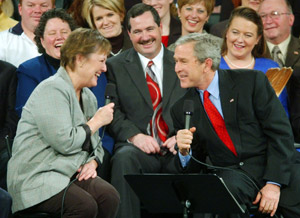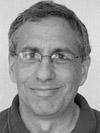| Home | Blog | Ask This | Showcase | Commentary | Comments | About Us | Contributors | Contact Us |

It's time Bush explained why he only talks to supportersASK THIS | March 61, 2005Political scientist Jeffrey Tulis writes that President Bush may be inventing a new political practice for a sitting president, by only speaking before screened audiences – and no one's asked him how he justifies it. By Jeffrey K. Tulis Q. President Bush is in the midst of a political campaign in which he is taking his case for Social Security to the American people. But as he tours the nation, he is only addressing carefully screened audiences of supporters. Those audiences do not include citizens who are representative of the diverse array of views in the country. How does the practice of limiting audiences of ordinary citizens to those who share his party affiliation or who already support his policies improve our constitutional democracy? Q. Some political observers think recent presidents, in contrast to earlier presidents, have erased the distinction between campaigning and governing. Does Bush agree that governing has become a permanent campaign and if so, is it good to govern this way? If not, what does he think are the most important differences between campaigning and governing? Q. Bush recently criticized President Vladimir Putin of Russia for his failure to advance "universal principles" such as a "free press and viable political opposition." Would he be more credible in calling for more robust forms of democracy abroad if he demonstrated his own commitment at home by engaging in real political discussion and welcoming challenging questions in his efforts to advance a domestic agenda? The tradition of presidents traveling the country -- "seeing and being seen" – dates back to George Washington. Washington felt that public appearances were important for the president – and his appearances were indeed open to the public. They were not policy speeches, and Washington was intent on establishing the precedent that the president was chosen to represent the whole country, not just his partisan supporters. For more than a century after the founding of the United States, it was considered highly inappropriate for presidents to publicly campaign for legislation while serving in the nation's highest office. When Presidents Theodore Roosevelt and Woodrow Wilson began the modern practice of appealing over the heads of Congress to the people at large on speaking tours – which they did to politically diverse audiences – they both felt compelled to defend and justify their departure from previous practice. Roosevelt and then Wilson publicly made the case that their speaking tours advanced the nation's commitment to democratic and constitutional values. Now President Bush has introduced a new wrinkle. Certainly, in the past, presidential advance teams have on occasion taken steps to assure friendly audiences. It has not been uncommon for presidents to seek invitations to speak at friendly venues. But systematically screening audiences for an array of speaking tours in the pursuit of a national domestic policy campaign may be a new phenomenon, and one that the president should be asked to defend and justify in terms of his constitutional obligations.
|
||||||||||||




